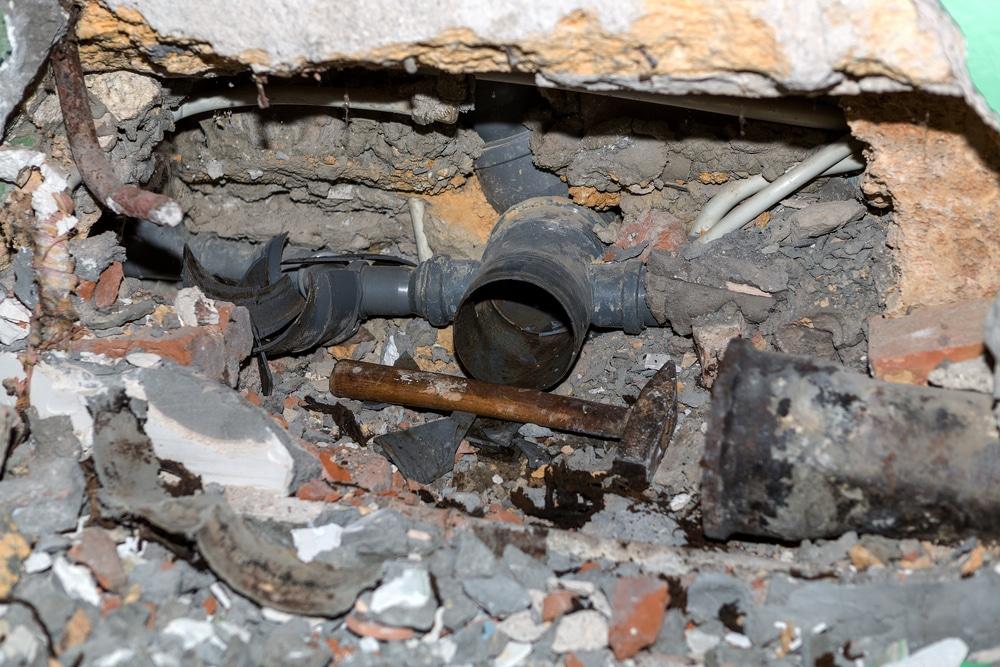A well-maintained plumbing system is crucial for safeguarding the comfort and health of your home. However, Las Vegas homeowners may, at times, encounter unpleasant sewer gas odors that can affect the quality of their indoor environment.
In this article, we explore the common causes of sewer gas smells and the preventive measures you can take to maintain a fresh and healthy atmosphere in your home.
Sewer gas smells are often the result of inadequate venting, damaged drain systems, or faulty plumbing fixtures, allowing sewer gases to escape into living spaces. In addition to being unpleasant, prolonged exposure to sewer gas can pose health risks to the occupants of a home. It is crucial to identify and rectify the underlying causes of these odors to ensure the continued well-being of your family.
Sewer gas odors can stem from various sources, including dry P-traps, vents or drains blocked by debris, cracked or broken vent pipes, or loose-fitting pipe connections. Understanding these causes is essential in implementing effective strategies to prevent sewer gas odor buildup in your home.
Join us as we delve deeper into the specific causes of sewer gas smells and the steps you can take to address them, ensuring that your home remains a comfortable and odor-free environment.
1. Maintaining P-Traps
The P-trap is a curved section of pipe beneath sinks, bathtubs, and floor drains that holds a water seal to block sewer gases from entering your home. If a P-trap becomes dry due to infrequent use, evaporation, or leaks, it can allow sewer gas odors to infiltrate your living spaces. To prevent this issue, follow these steps:
– Regularly run water in seldom-used sinks and bathtubs for a few minutes to keep the P-trap filled.
– For floor drains, pour a small amount of mineral oil into the drain to slow down the evaporation process, ensuring that the P-trap remains filled.
– Inspect P-traps for leaks or damage and replace them if necessary.
2. Clearing Blocked Vents and Drains
Sewer vent pipes help equalize air pressure in your plumbing system and release sewer gases to the outside. However, these pipes can become blocked by debris, leaves, or even nesting animals, causing sewer gas to build up and enter your home. Additionally, slow or clogged drains can create the perfect environment for sewer gases to develop. To address these issues:
– Regularly inspect and clear vent stacks on your roof to ensure they are free from blockages.
– Utilize drain strainers to prevent hair, soap scum, and other debris from entering your drains.
– Schedule professional drain cleaning services to remove stubborn blockages and keep your plumbing system functioning efficiently.
3. Repairing Damaged Vent Pipes
Cracks or broken connections in vent pipes can cause sewer gas odors to escape into your home. These issues may result from aging pipes, improper installation, or external forces such as tree root infiltration or ground shifting. To tackle damaged vent pipes:
– Schedule a professional plumbing inspection to identify any damaged or improperly installed vent pipes.
– Repair or replace any cracked or broken vents to prevent sewer gas escape.
– For tree root infiltration, consider tree root removal or root barriers to protect your plumbing system.
4. Ensuring Tight-Fitting Pipe Connections
Loose-fitting or improperly installed pipe connections can lead to sewer gas leaks and foul odors inside your home. It is crucial to ensure that all plumbing connections are secure and correctly installed to prevent sewer gas infiltration. To address this concern:
– Regularly inspect plumbing connections for signs of looseness or damage.
– Tighten or replace any loose or damaged connections to maintain an airtight seal.
– Seek professional help when installing new plumbing fixtures or connections to ensure proper installation and fitting.
Eliminating Sewer Gas Odors: Additional Remedies and Considerations
If you’ve addressed the primary causes of sewer gas smells and still experience persistent odors, consider these additional remedies and factors:
1. Clean and Deodorize Your Drains
Regularly cleaning and deodorizing your drains can help eliminate odor-causing bacteria and residue buildup. Use non-corrosive, environmentally friendly cleaners such as baking soda and vinegar to keep your drains fresh and odor-free.
2. Inspect and Replace Wax Toilet Seals
Wax seals beneath toilets can deteriorate or loosen over time, allowing sewer gas to seep into your home. Regularly inspect these seals and replace them if necessary to maintain an airtight connection between the toilet and the drainpipe.
3. Investigate Hidden Plumbing Issues
Persistent sewer gas odors may indicate hidden plumbing issues such as leaks, holes, or damage concealed within the walls or flooring. Seek professional assistance to uncover and address any hidden problems that might be contributing to the sewer gas odors.
Final Thoughts
Preventing sewer gas odors in your Las Vegas home is essential for maintaining a comfortable, healthy, and enjoyable living environment. By understanding the various causes of these odors and implementing the preventive measures mentioned in this article, you can effectively safeguard your home against sewer gas infiltration.
When plumbing issues become too complex or challenging, consider seeking the expertise of professional plumbing services. At Vegas Drain Masters LLC, our team of skilled technicians is ready to assist with any drain or plumbing concerns you may encounter, providing fast and efficient solutions for Las Vegas, NV, and the surrounding areas. Contact us today for sewer line repair in Las Vegas!
